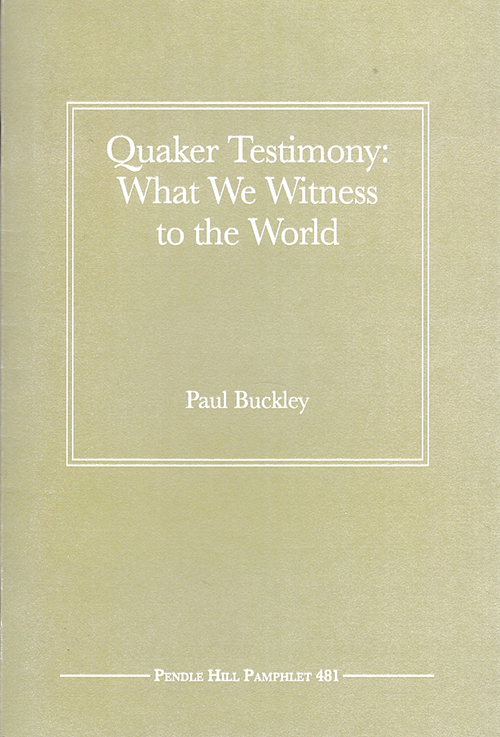
Quaker Testimony: What We Witness to the World
Reviewed by Marty Grundy
January 1, 2024
By Paul Buckley. Pendle Hill Pamphlets (number 481), 2023. 34 pages. $7.50/paperback or eBook.
“So you want to learn more about Quakerism?” I used to tell newcomers: find a Quaker, follow her around and watch how she lives. Paul Buckley has given us the Pendle Hill pamphlet we have been waiting for: one that rightly describes Friends testimony as the witness of our lives, 24/7.
The first part of the pamphlet describes the historic role of Quaker testimony.
For early Friends, a testimony was “an act that publicly witnesses or testifies to an aspect of our most basic spiritual beliefs;
it is an outward expression of something that the Inward Light has revealed to an individual or a group of people.” Buckley describes five characteristics specific to a Quaker testimony:
- It originates with a divine leading, not something we think is a good idea.
- It is a consistent public behavior, not an occasional or private action.
- It is communal behavior, not just personal.
- It is a challenge to act outside one’s comfort zone, and for others because it challenges their assumptions and normal conventions.
- It is rooted in God’s love for us and our love for the deep well-being of others.
Under persecution, it was obvious who was a Quaker and who was not. But after the 1689 Toleration Act, it became easier for someone to claim to be a Quaker while not having to do anything unpopular or difficult. In the eighteenth and early-nineteenth centuries, strict rules of behavior were codified: no longer to mark the frontier of the Lamb’s War but as a boundary between Friends and non-Friends. The rules became like a creed for Quakers. But as major social, economic, and political changes multiplied—especially after the U.S. Civil War—these archaic rules broke down and were largely abandoned. The inner spiritual truth behind them had long since evaporated for most Friends.
======
Today most Friends are familiar with SPICES, an acronym for a basket of Quaker testimonies. There is no official definition, but often the letters are taken to stand for simplicity, peace, integrity, community, equality, and stewardship/sustainability.
Apparently the acronym began in the 1990s as a teaching tool for children (although the idea to single out Friends’ social principles into a list originated over 40 years earlier with Howard Brinton), especially to help non-Friends in Quaker schools get a handle on “Quaker values.” Buckley points out that “values are things we decide on. Testimonies are products of the Inward Light.”
=====
The dangers of emphasizing SPICES rather than testimony is that the former become a secular creed: the easy answer to the question, what do Quakers believe? SPICES do not need spiritual roots. They are generally acceptable to nearly anyone and are not distinctly Quaker. In effect, SPICES dumbs down Quakerism.
Instead of a vibrant faith based on listening for guidance from the Divine, it is a list of things to do. Instead of the traditional aim to be faithful, SPICES encourages us to be task-oriented, to achieve successful results. Everything Friends stand for has to be shoe-horned into one of these words, or we need to add more letters. Finally, by assuming the SPICES are the sum total of Quaker life, we constrict our vision of spiritual gifts. Above all, where is love in the list?
=====
Our testimony is our life; let our lives speak.
When necessary, use words. This pamphlet is highly recommended for every meeting to read and consider together. Discussion questions are included.
Marty Grundy is a member of Wellesley (Mass.) Meeting and has been trying for years to relay the message in this pamphlet to Friends.
